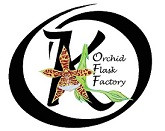1 - Water and Orchids – Measurement and Adjustment
1 - Water and Orchids – Measurements and Adjustments
In the intricate world of orchid cultivation, precise water management and carefully customized fertilizer application are fundamental to achieving exceptional results.
Orchids are exquisite and exotic plants, but their health and blooming depend significantly on the amount of water and nutrients they receive.
It's important to remember that most orchids are epiphytes; they grow on tree branches with roots attached to bark, providing stability and absorbing rainwater and nutrients carried by the wind, while simultaneously receiving energy from sunlight.
Their interaction with the environment is entirely different from terrestrial plants.
This technical guide delves deeply into the art of mastering these two essential factors. By understanding the nuances of this practice, you can create an optimal environment for your precious orchids, achieving results that will delight even the most discerning botany enthusiasts.
Watering for Optimal Nutrient Absorption
To water effectively and ensure proper nutrient absorption, it is essential to invest in the appropriate tools to measure and adjust your water quality.
If you are a beginner, visit this page for more information: https://orchid-info.org/conseils/engrais/
Water – The Foundation of Everything
The key concept is that you can only control what you can measure.
For orchid care, start with the principle that the purer your watering water is (free of salts and impurities), the better you can adjust it to provide the nutrients your plants need.
To draw a simple comparison, it’s like testing and controlling the food you consume. The purer your water, the more fertilizer you can add. Conversely, water high in salts limits how much fertilizer can be used.
Examples of Water Types:
- Rainwater: Perfect unless it runs off zinc roofs or gutters (risk of high zinc concentration).
- Reverse osmosis water: Ideal.
- Deionized water: Very good, provided it’s not processed with sodium.
- Softened water: Never use, as it usually contains sodium.
- Bottled water: Avoid all types.
- Tap water: May be suitable depending on conductivity (check on https://sante.gouv.fr/sante-et-environnement/eaux/eau).
Equipment
Suitable Water – Reverse Osmosis System
Reverse osmosis systems have become more affordable, with prices ranging between 40 and 80 euros.


I personally tested the WATSEA osmosis system and was pleasantly surprised by its quality and price (starting at 39.99 euros at ZOOMALIA).
Alternatively, some garden centers with aquarium sections offer free or low-cost reverse osmosis water. Choose based on the number of plants you have.
Measuring Water Quality – Conductivity Meter
A conductivity tester is essential for measuring water quality. I recommend the waterproof EC pen IP57 (6061) priced at 49 euros from Culture Indoor.

Avoid very low-end devices, as they may be unreliable.
Calibration Solution
I use Buffer EC 2.76 MS/CM 250ml, available at 4.50 euros from Culture Indoor.
Begin by using a conductivity meter calibrated in microsiemens (not millisiemens) with an appropriate solution.
Once the meter is ready, measure your water and adjust your fertilizer.
Important: Always add approximately 10% tap water to buffer your solution and prevent salt precipitation before measuring.

Target conductivity levels:
- 250-450 µS/cm for most epiphytes with root watering.
- 150 µS/cm for foliar spraying and plants with thin leaves.
Fertilizer dosage depends on water conductivity. The lower the conductivity, the more fertilizer can be added.
Make a concentrated fertilizer solution using warm tap water, then add it gradually to reach the target value.
Additives for Root Growth
For enhanced root development, I recommend Osiryl, a revolutionary root growth stimulant made of lignosulfonates (biostimulant). Use 2 ml per 5 liters of water every second watering, adding it after fertilizer adjustment.
Composition:
- 40% active material (OSYR).
- 50% dry matter.
- 8% sulfur trioxide (SO3).
- pH: 3.7 (+/- 0.7).

Additional additives will be discussed in the next section on fertilizers.
pH Meter – Measurements and Adjustments
For optimal nutrient absorption, pH adjustment is necessary. Use a pH meter, which must also be calibrated.

You will need four products:
- pH 4 solution.
- pH 7 solution.
- Storage solution.
- Cleaning solution.
pH meters can be automatic or manually adjusted via screws.
Calibration
Start by calibrating at pH 4, using the left screw, followed by pH 7 with the right screw. Clean the probe twice a month by soaking it in the cleaning solution for 24 hours.


Adjusting pH
After measuring conductivity, test and adjust the pH. Use white vinegar or organic lemon juice to lower pH, or specialized products like "Acid Down" available in grow shops.
Optimal pH Range: 5.5–5.8 (ideal at 5.7) for maximum nutrient absorption.
Recommended pH Meter and Costs:
- pH Meter: Platinum waterproof IP57 from Culture Indoor, 49 euros. Features replaceable probes.
- Calibration Solutions: pH 4 and pH 7 solutions, 4.50 euros each (Culture Indoor).
- Cleaning and Storage Solutions: 7.50 euros each (Culture Indoor).
Though the total cost may appear high (~225 euros excluding shipping), this investment ensures long-term plant health, precise water control, and exceptional blooms.
For further assistance, watch the video tutorial provided.
The next section will cover fertilizer programs and additives.
Share this content

By Elisabeth 07/27/2025 08:19:26
Alors pour ma part je n'utilise plus du tout l'eau du robinet j'ai perdu beaucoup de plantes elle est vraiment trop calcaire. Je prends donc de l'eau en bouteille.
View replies (1) -
By Kay orchid Blog Author 07/28/2025 17:24:03
Bonjour, sauf que l'eau de bouteille est majoritairement composée de sels et à un moment donné, ça risque de tuer vos plantes. Idéalement eau osmosée ou déminéralisée avec engrais. belle journée
By Teriipaia Steeve 04/15/2025 03:54:30
Bonjour merci pour la vidéo je voudrais savoir si ont peut utiliser ces engrais que vous avez préparé pour la culture de la vanille merci bonne continuation.
View replies (1) -
By Kay Blog Author 07/20/2025 05:19:25
Bonjour, oui tout à fait elle poussera mieux. Belle journée !